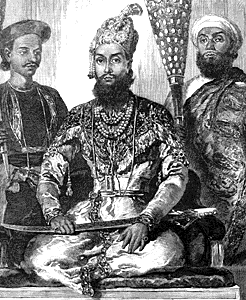 |
 |
The Illustrated London News
September 12, 1857
| THE ELDEST SON OF THE KING OF DELHI, HIS TREASURER, AND PHYSICIAN |
| "These fine portraits have been engraved from a picture, painted in the Fort or Palace of Delhi, by Mr. William Carpenter. The group consists of the eldest son of the King of Delhi; his Treasurer, a Hindoo; and Physician, a Mussulman; each carrying a morhrchull, a brush made of peacocks tails, to drive away the flies - which duty is really performed by servants. |
| "The titular Royal family of Delhi belongs to one of those central Asiatic Tartar races that have repeatedly won for themselves dominions south of the Himalaya, through the valour of Uzrian and Mongol followers. Timour, Baber, Akbar, and Aurangzebe, were all of the family of the present incumbent of the musnud of Delhi, and were the most illustrious of his predecessors; in fact, it is the splendor recorded of them that alone gives historical importance to the shadow of the Great Mogul. |
| "Baber was a linel descendant of Timour, and in his successive conquests of Cabul, Bokhara, and Hindostan, his career was, on a smaller scale, similar to that of this formidable Tartar Emperor. The great battle of Panipat laid India at his feet; and in 1526 - the very year of the conquest of Hungary by Suliman the Magnificent - Baber entered Delhi, and founded the dynasty which still has a nominal existence. |
| "Akbar has been extolled by the Oriental historians as having 'no faults except virtues carried to the extremes.' He certainly was a great warrior, and at the same time capable of the rare Royal desiderata of justice, mercy and generosity. On the other hand, many instances are adduced of massacring of captured garrisons, &c. Akbar reigned fifty years; built magnificent palaces and mosques; and promulgated the celebrated code called Azeen Akberg; which, although full of futilities according to the European standard, is, nevertheless, a remarkable monument for the times and degree of barbarism then existing. |
| "Akbar was the contemporary of our Elizabeth; and Aurangzeb of our Charles II. and William.; all the life of this latter prince being passed in war with this and that petty dynasty, in which he was always successful. But his reign had all the vices of Oriental rule: magnificent structures were erected, but the mass of the people groaned under the most odious exactions. |
| "With the gradual annexation of the dominions of the Padishah to the East India company all our readers are familiar. Previous to the late outbreak the nominal King, descendant and representative of these men, received £10,000 per month, or £120,000 per annum. But the landed property of the King is said to amount to a much larger sum, so that the whole income was from £200,000 to £300,000 a year, a portion of which, however, was spent under the direction of Mr. Fraser, the British Resident. Formerly the Padishah of Delhi and his son resided in the magnificent palace of his ancestors; but it having been required for other purposes - in fact, with all its magnificence, it was tumbling into ruins - he has latterly lived in the new city of Delhi, which was fortified by our engineers, and unfortunately, garrisoned by a native force, the 38th, 54th, and 74th Regiments. |
| "What part the titular King has actually played in the recent awful tragedy it is impossible as yet to say. Secretly, no doubt, he wished the destruction of the English, and some restoration of his family rule. But the fear of losing his life and pension, and the prestige of English domination, made it very doubtful that he was more than a mere passive tool in the hands of the insurgents, who had proclaimed not himself, but his son, as their leader; in fact, he sent a message to the Lieutenant-Governor of Agra, stating that he was not master of his actions. |
| "All this will, no doubt, be fully investigated at the close of the revolt. Even should this descendant of Timour and Auranzebe not be guilty, it is clear to us that the British, as in the case of the King of Oude, must take sufficient precautions against any future use of an Imperial authority through this august puppet. Every account from India clearly shows that it is the Mussulmans who are at the bottom of the insurrection, and that Hindoos are only the instruments. The King of Delhi may not have planned, or even have fomented, the insurrection. But a Prince with a historical name in Delhi, the focus of the Moslem fanaticism in India, without a single European regiment inside, is a placing of military and political capital in the hands of our enemies which, we are persuaded, will not soon happen again. |
| "The proper title of the King of Delhi is Padishah - a title also assumed by the Ottoman Sultans; in fact, they are both enthnologically of the same race, although the title of Padishah is Persian, and Sultan is Arabic (i.e. potentate). Up to a very recent date the Padishah was called by the Hindoos the Rajah of Indraprestha, and on coins he was styled 'Emperor of the World.' But in latter times the Company had declined all his propositions to renew any monetary currency. The 'heir apparent,' as he was called, had a seperate household, with handsome allowances from his father. A large portion of the revenue was given to idle ulemas, dervishes, and hangers on; one half of them rabid fanatics, and the rest dissolute and disorderly flatterers and dependents." |